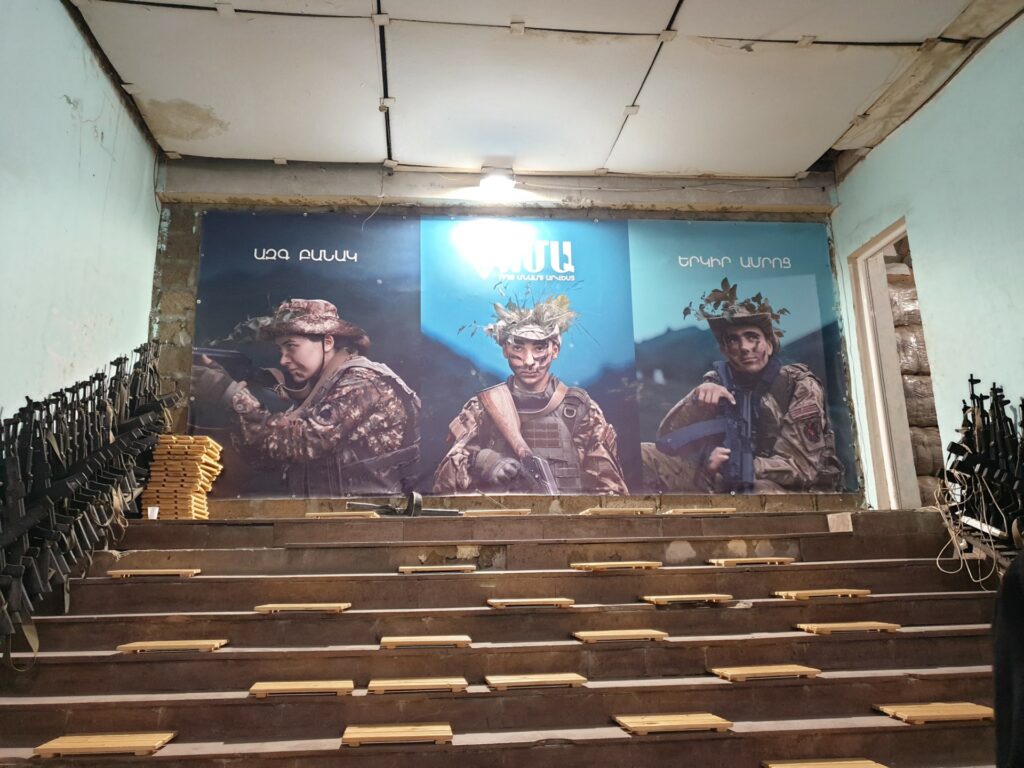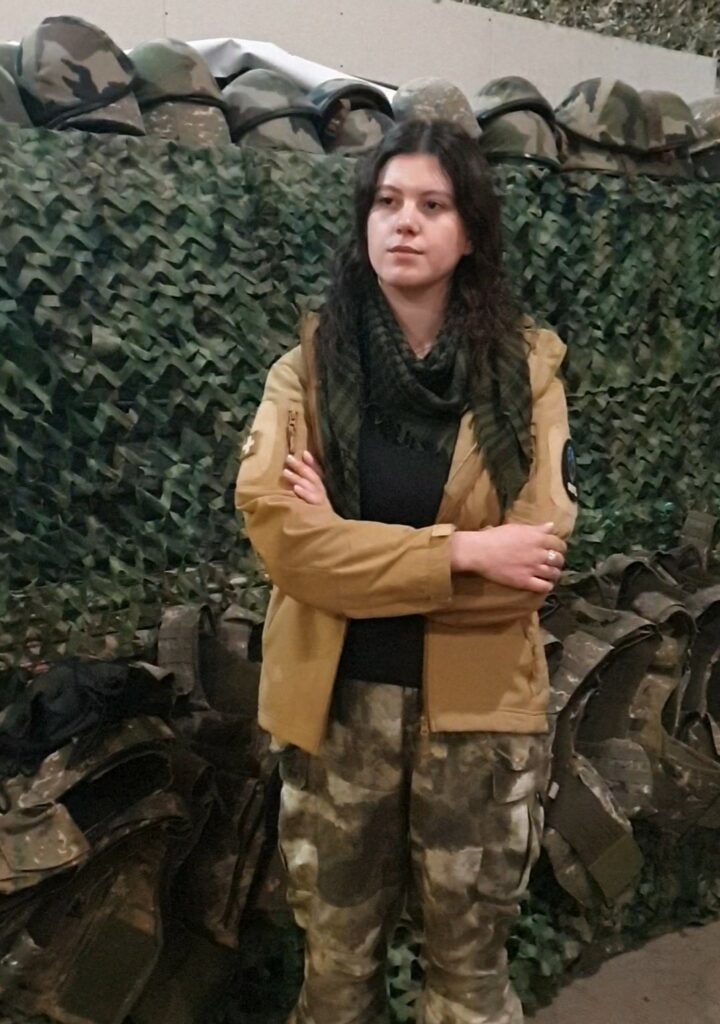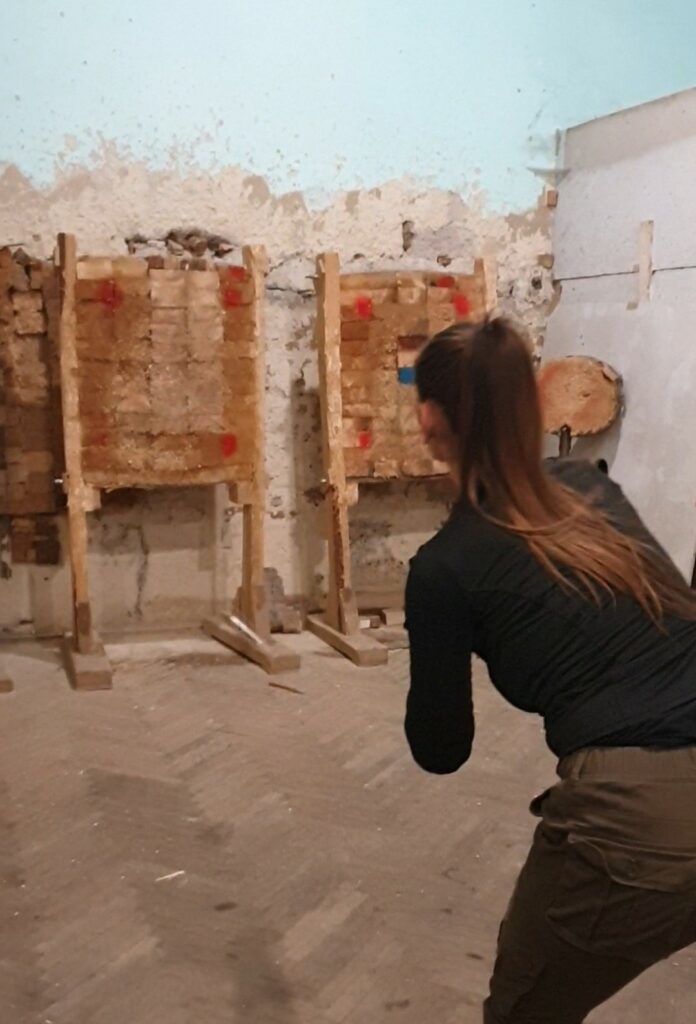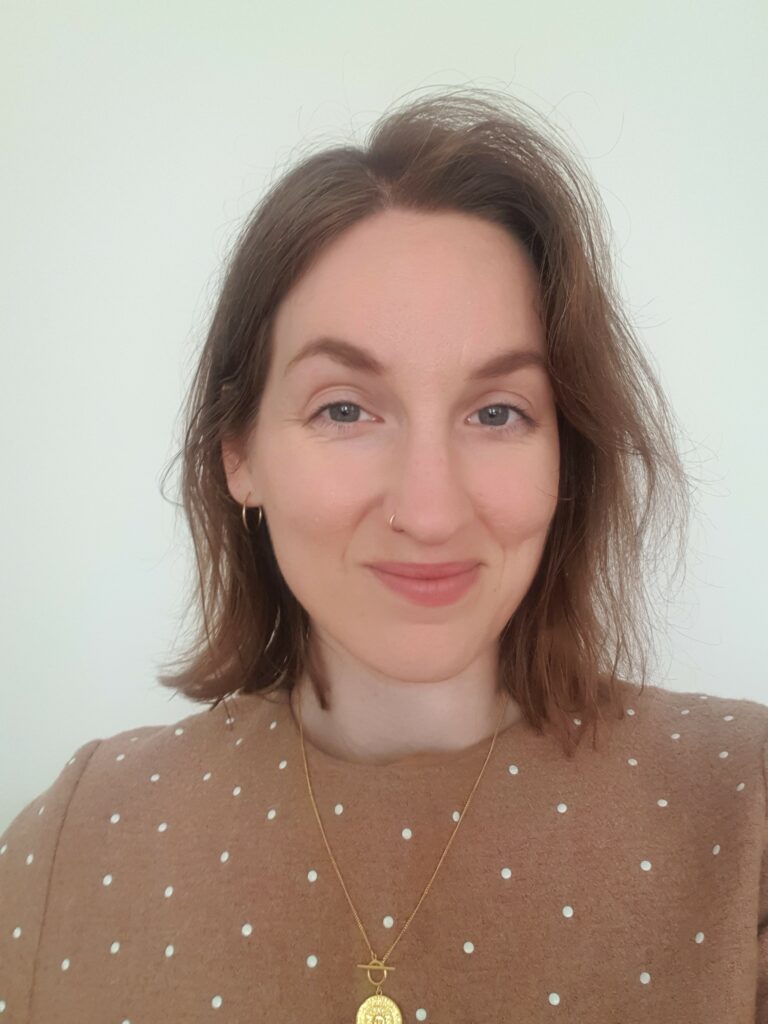Born and raised in Armenia, young Armenian woman Nané never wanted to have anything to do with the war in her homeland. When Nané could no longer ignore the situation after the 44-Day War in 2020, she decided to take action. Having joined VOMA NGO two years prior, the 21-year-old now leads training groups there every day. During my visit to VOMA I delved into unraveling the protocol of radicalization, seeking to understand the catalysts that sparked Nané’s transformation.
by Britta Rotsch

What is your motivation for defending yourself?
I’ve lost a classmate during that 44-Day-War, and as I approached my 18th birthday, a key moment I had eagerly awaited, I found myself praying in a church for the recovery of my classmate’s body. There, it struck me that some lose their lives when they just turn 18. I came to understand that it’s kind of my responsibility to not live only my life, but also his life, and he fought for that land, he lived for that.
Have you always been interested in defense training?
Back in 2019, my brother took part in a 10-day camp aimed at helping Karvachar. I remember his return, all enthusiastic about it, describing how cool it was. At that time, I thought to myself, “No way I’d ever join something like that; it sounds crazy, it‘s wild.”
What changed your mind?
In 2020, after the 44-Day-War ended, I turned 18. I was feeling awful and helpless and asking myself what I could do. It was the year of COVID, every store was shut down, the university too. I was very demotivated. I wanted to learn something because I was feeling very weak and powerless. So I thought that at least I could learn self-defense and weapon use. But I need to mention that I was extremely scared of guns, shooting and stuff like that. I told my father about my wish of going to VOMA. He looked at me, nodded his head and said “Okay, let’s go together.”
That sounds unusual to go with a parent. How was it?
My father and I were sitting together, and I was shy as it was the first time when me and my father were in the same student role. Due to the large number of attendees, every group was split into two. So I told my father, “Dad, we are going to be in different groups all the time, okay?” He laughed and agreed. We didn’t tell anyone that we were father and daughter. It was only during the second month that our instructors and fellow group members discovered that we were related because they thought that we just looked alike. When I was afraid to descend during the mountain climbing class, my father looked at me and said: “Okay, do it, do it, do it! If you do it, after that I will try.” This motivated me.
How is it for you especially as a woman to do defense training?
I recall the scene vividly—a crowd dressed in regular clothes, among whom stood two women in military uniforms. I gazed at them and thought: “Wow, is it possible in here?” Those two women in uniforms looked so confident und strong. After over two years, these same individuals are now my colleagues, and I know they are very sweet and very feminine. But at the same time, they were part of this everything. And for a moment I wanted to be like them. It has changed something in me.

What were you doing on September 19, 2023 when Azerbaijan attacked the Nagorno-Karabakh region?
I remember it was a Tuesday, and my friend and I, as members of the university’s student council, were holding mentoring sessions for junior students. Initially, everything seemed fine—a fun and engaging session. Then, my friend called me. “Do you know what’s happening, both here and in Artsakh?” I said I was aware but had been trying not to think about it. And she was like, “No, no, no, I guess the war has restarted.” She called me as she thought I had some news due to my VOMA affiliation. I skipped a few classes, hurried to VOMA, and that’s when reality hit me. Amidst the chaos elsewhere, VOMA felt calm—everyone tried to do their tasks. The atmosphere was serene compared to the city center. Other first aid instructors were in here, and they told me to go back to the university. But I couldn’t—my mind needed diversion. So, I occupied myself with organizing supplies for the first aid kits designated for our battalion members. It wasn’t a big thing, but I needed to do something other than thinking endlessly.
Armenia lives with the constant fear that war could break out. What is it like for your generation to grow up with such a feeling?
For me it is hard to think about war and the future here. I try to occupy myself doing stuff like this. At the moment, my work feels important, and it is better to do something instead of just sitting and overthinking endless scenarios.
As days passed, and the Republic of Artsakh and its people appeared in a very bad situation, I found myself devastated, but I was trying to do my best, by helping as many people as I could on every front. In the end, however, nothing depended on me. It still happened the way it did, but life continues, so we should continue doing some work.
Do you think about what would happen if a war broke out?
I believe that although the battles and shootings might have stopped, the war itself hasn‘t. Unfortunately, some tend to overlook the ongoing dangers that persist at the front line, which remains highly unsafe. Personally, I try not to think about potential outcomes, as I haven’t experienced the true extent of war. I hope to never witness it. However, if faced with such a situation, I find solace in knowing what to do. How to provide first aid—an essential skill to assist others. Also, knowing self-defense techniques, handling a firearm, and defending my loved ones, my family are vital for me.
And what does your family say about your involvement here?
I would say my parents are sometimes very scared, especially when there is some news coming from our enemies labeling certain people or this organization as terrorists, and they realize that I am a part of it. My father and I are engaged with VOMA. He actually is a volunteer, like in a reserve army, he’s from VOMA Battalion, while I work as an instructor, so we both try to contribute to this in some way. Despite concerns, my mother supports our involvement and even says that she would like to join too if there is a chance. It’s huge, because in the beginning, she used to tell me “You’re a girl, stop going there.” I hope my brothers will come to VOMA soon, so I’m working on that. One of them is 19, serving in the army, and the other is 8. So I am waiting for him to turn 16 at least to come here.
You spend most of your time at VOMA. How is that for your friends and family?
Even at my university I talk so much with women that sometimes they are even annoyed. But it is my life—I come here every day. While some support the idea, others express interest but claim lack of time. But of course I appreciate my friends who have already come and trained in here or are associated with VOMA. It’s within these sessions that I meet individuals sharing similar ideologies, beliefs, and thoughts. But honestly, it is hard sometimes. I’ve lost friendships. I have also friends who criticize it. They are not very close persons, however, I’ve distanced myself from them, as they failed to understand my vision for VOMA. They questioned my choices, asking why I would do this and suggesting it would ruin my life or youth. I told them I don’t consider it ruining, and that’s just their opinion. Through VOMA, I’ve found numerous friends, people with whom I wish to continue living in this country, individuals with whom I would start to build something.
How has the time at VOMA changed you?
I became more confident, I would say stronger mentally and physically. When I joined the organization, I started believing in real teamwork. Secondly, I realized that fears are only in my head, and need to be overcome, which is very scary. I know it is. I discovered myself from other perspectives. If you want to do something, you will eventually try harder and harder. Similarly, the gun is scary and everything military is scary, unless you know how to treat them right. Now I’m trying to overcome my fears.
Do you have an example for it?
I remember my first time shooting, when the sound was loud, and my instructor was telling me to repeat it because there were several bullets left. I couldn’t do it as I was shocked of the sound. I was the only one shooting. What if others would shoot too? There would be such a big explosion of noises. I got used to some physical discomforts when holding the gun. The weight of the gun, the strain on my back, and the awkward positions have become a part of the routine.

How did you prepare yourself for teaching?
I was reading psychological books on how to treat people, how to treat a classroom. A psychologist told me, “If you tell your rules, people obey them. If you don’t, how are they going to know?” I wrote everything down and after that I became an instructor and got many compliments for my teaching.
How was this manifested?
In the beginning, during the initial lessons, I often felt the weight of curious gazes questioning my presence—a young woman teaching military tactics. Comments like, “She’s so young, she looks cute, but her strict instructions surprise us,” were common.
This experience reflects a broader sentiment among many young Armenians today. They express a sense of loss, feeling that their choices depend on the country’s situation. It’s a sad reality. But I want to believe that someday they will come when there is peace. However, the only way to gain that peace is to be so well-prepared for the war that they do not even try to attack you.
That sounds a little bit unrealistic.
I maintain a sense of optimism, but I’m not a hopeless romantic who thinks that everything is going to be perfect. Growing up has not only added years but also maturity to my mindset. My worldview has changed, especially after the war. Here, it’s a common saying that if we don’t go to the front line, the front line will approach us—that’s the reality. Especially now, as the actual front line inches closer to Yerevan, we should not let it happen. So before it does, we should take every possible measure. I believe that if many share a similar mindset, we can become very strong and resistant, precisely what’s needed in this moment.
This article was published within the frames of “Correspondents in Conflict” Project,
implemented by Yerevan Press Club and Deutsche Gesellschaft e. V. The Project is
funded by the German Federal Foreign Office within the “Eastern Partnership Program”.
The contents of this article are the sole responsibility of the implementing partners and can in
no way be taken to reflect the views of the Federal Foreign Office. #civilsocietycooperation
 Britta Rotsch is a freelance journalist from Berlin who studied sociology, psychology and gender studies in Kassel (Germany) and Vienna (Austria). She has spent the last seven years working from Vienna for public radio and writing reports for print magazines. As a journalist and podcast author, her focus is on serial narrative formats, as well as scripted formats on socially relevant topics like abuse of power. Britta also writes magazine stories for German speaking print media and is currently working on her first non-fiction book.
Britta Rotsch is a freelance journalist from Berlin who studied sociology, psychology and gender studies in Kassel (Germany) and Vienna (Austria). She has spent the last seven years working from Vienna for public radio and writing reports for print magazines. As a journalist and podcast author, her focus is on serial narrative formats, as well as scripted formats on socially relevant topics like abuse of power. Britta also writes magazine stories for German speaking print media and is currently working on her first non-fiction book.












